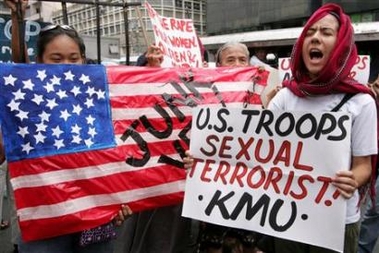|
Philippines to charge four US soldiers for rape
(Reuters)
Updated: 2005-12-27 10:53
Philippine prosecutors were set to file rape charges on Tuesday against four
U.S. Marines, while clearing two other soldiers accused of assaulting a
22-year-old Filipino woman in early November.
In affidavits, five of the Marines had disputed allegations that the woman
was gang-raped in a van at a former U.S. Navy base at Subic Bay, suggesting
there was consensual sex.
The sixth soldier, who had also taken part in two-week military exercises
with Philippine troops in October, did not submit an affidavit.
The Filipino driver of the van, initially considered to be a witness, was to
be charged as an accomplice, according to documents to be submitted to a court
in Olongapo City, northwest of Manila.
"We are happy the girl is going to get some kind of justice," said Katrina
Legarda, a lawyer for the complainant.
In the charge sheet seen by reporters, Olongapo City chief prosecutor
Prudencio Jalandoni said evidence suggested the two soldiers to be cleared were
not in the van at the time of the alleged rape.
After receiving the charge sheet later on Tuesday, the court was expected to
select a judge who will hear the case.

Filipino female protesters hold signs during a
protest near the U.S. embassy in Manila November 5,
2005.[Reuters/file] | U.S. officials said the embassy was likely to issue a statement once the
charges were filed formally.
The Marines were being held at the U.S. embassy in Manila but Washington has
not responded publicly to a request by the Philippine foreign affairs department
to transfer custody of the soldiers to local authorities.
The woman who filed the complaint and the six soldiers did not attend three
public hearings held since late November.
Beyond small protests by a leftist women's group outside the court in
Olongapo City, the case has caused little public outcry or anti-American
sentiment in the Philippines, the only former U.S. colony in Asia and a major
ally of Washington in the region.
Relations between the two countries deteriorated in the 1990s when Philippine
senators ended a treaty allowing U.S. forces to keep naval and air bases that
had been used as staging points during the Vietnam War and the first Gulf War.
The bonds were repaired in 1999, when a more friendly Philippine Senate
agreed to a Visiting Forces Agreement that permits U.S. troops to join military
exercises and train local units that are
battling insurgencies.
|